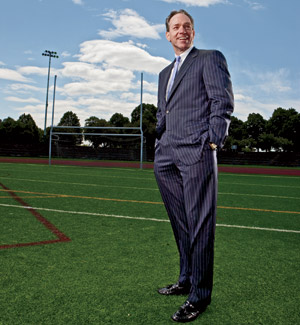The Great Recession is going smoothly at Suffolk Construction Co., the dominant general building contractor in Boston. Yes, backlog is down. Sure, employees have been let go or reassigned. Most building contractors have done the same. But on a recent May morning at Suffolk’s headquarters in a converted industrial building in the tough Roxbury neighborhood, the company’s sole owner and chief executive is so pumped with optimism you would hardly guess the building-construction sector is in the middle of a historic slump.

Upon meeting John F. Fish at the headquarters, he doesn’t immediately show off Suffolk’s portfolio of multi- million-dollar hotel and hospital renovations or display his company’s training curriculum; rather, he introduces a professorial gentleman with a caramel voice and perfect diction, standing in the doorway of a conference room.
“This is our speech coach,” Fish announces.
Fish and Suffolk have a lot to say.
An open-shop suburban Boston start-up founded in 1982 that now operates in New England, the Southeast and Southern California, Suffolk says it aims to build a national brand. To do it, Fish has immersed his staff in corporate culture—passion, exceeding customer expectations and even a jobsite dress code—and has steeped himself in strategy. To this end, Fish recruited a Harvard Ph.D. with expertise in corporate strategy and put him in Suffolk’s executive suite.
Last year, Suffolk’s strategic masterpiece was the acquisition of William A. Berry & Son Inc., its biggest New England health-care market competitor. The buyout allows the roughly $500-million-a-year Berry to bond even more work as part of the expanded Suffolk. The parent company now ranks 31st on ENR’s list of Top 400 Contractors with $1.7 billion in revenue. Suffolk doesn’t disclose earnings, but it is believed to be cash-rich and without debt.
Looking Beyond New England
The recession has opened up new opportunities for Suffolk to use its profits from the boom years to acquire companies, such as Ashburn, Va.-based Dietze Construction Group, which filed for bankruptcy protection on May 20. Suffolk also has taken on distressed projects, hired away experienced talent and explored carefully chosen new offices, like the one it anticipates opening in Nashville. In its key territories and market categories, Fish says Suffolk plans to go narrow and deep—almost as if he were describing a football pass pattern. As part of the overall plan, Fish’s “big, hairy, audacious goal,” to use author and management guru Jim Collins’ phrase, is shifting Suffolk’s base from commercial to institutional clients involved in health care, technology or biosciences and using Suffolk’s skills in project delivery and technology to grow a big share of this demanding class of client. “The barriers in those markets are so much different than the low-hanging fruit” in the commercial market, says Fish.
The Berry division’s former owner and current chief, Peter Campot, 51, a laconic former surveying rodman who worked his way up in the industry, could not seem more different from the energetically talkative Fish. Yet Campot claims the two are more alike than different, saying, “We’re both obsessed with planning.”
Indeed, John Fish doesn’t try to conceal what so urgently obsesses him.
Fish will tell you straight out that, at age 50, Suffolk Construction “means everything to me.”
Says Mark Erlich, executive secretary-treasurer of the Boston-based New England Regional Council of Carpenters, “I don’t know anybody as driven as he is.”
| 1982 | Edward Fish Sr., owner of Peabody Construction in Boston, founds Suffolk Construction Co. as an open-shop building contractor and mentors one of his sons, John F. Fish, who runs the operations. |
| 1989 | Suffolk follows an existing client to South Florida to build an assisted-living/health/medical building. The firm gradually builds up its Florida operations. |
| 1993 | Following a campaign by the carpenters’ union to pressure the firm, Suffolk reaches an understanding with the carpenters, opening the door to work in downtown Boston while still working non-union in other areas. |
| 2006 | John F. Fish buys out his father’s minority interest. |
| 2009 | Suffolk acquires William A. Berry & Son Inc., its top New England health-care rival, and plans to expand its California and mid-Atlantic bases. |
Fish mentions he has an older brother, Edward A. Fish Jr., or Ted, whom their father, Edward A. Fish Sr., put in charge of the Fish family’s main contracting business, Peabody Construction Co. That firm went bust in 2005, ruining what Bostonians say had been the cream of the city’s old-line family construction businesses. Court records show the Peabody wipeout resulted in a bitter court dispute. Peabody’s surety, Travelers Casualty and Surety Co. of America, sought $24 million from Ted Fish, but the parties recently reached a settlement agreement. Ted since has started an interiors contracting business in Florida.
What John Fish doesn’t mention—and what others who know him claim—is that, until 2005, the rivalry with his brother fueled some of his competitive drive. In fact, John had grown Suffolk bigger than Peabody at the time Peabody failed.
With the sibling rivalry finally in the past, John Fish now is driven by his vision of what Suffolk can become in the context of the new, post-recession realities.
“Going through this economic tumult in many respects is one of the best things that’s happened to Suffolk, and I say that [with pain],” he says. “It causes us to sharpen our cost model, review our systems and reposition ourselves to be more of an institutional company” with fewer commercial clients. Then Fish asks, “How do we turbocharge our company through this tumult?”


Post a comment to this article
Report Abusive Comment